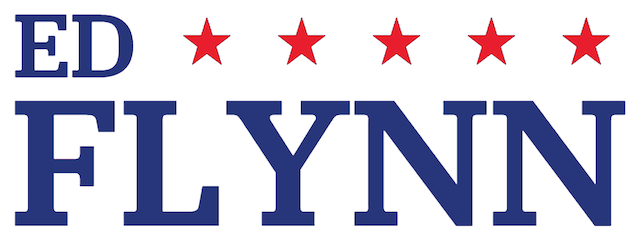Edward M. Flynn, son of a longtime Boston mayor, posted a solid victory Tuesday night in a City Council district that includes South Boston, Chinatown, the South End, and Bay Village. Winning 56 percent of the preliminary election vote, he will face former Menino administration aide Michael Kelley in the November final.
Voters from Roxbury to East Boston picked the finalists in four council races in all. Several of them pitted Boston’s political establishment against upstart candidates who hail from changing neighborhoods.
In a closely watched race in District 1, covering East Boston, the North End, and Charlestown, Stephen Passacantilli, who is close to Boston Mayor Martin J. Walsh, scraped past East Boston attorney Lydia Edwards by just 77 votes, according to unofficial results.
Kim Janey, senior project director at Massachusetts Advocates for Children, secured the highest vote total in District 7, the seat that Councilor Tito Jackson is vacating in order to run for mayor. Rufus J. Faulk, program director for an antiviolence group, narrowly scored a second-place finish over community activist Deeqo Jibril, who fled Somalia as a child.
The top two vote recipients in each race — for Districts 1, 2, 7, and 9 — will proceed to the municipal elections on Nov. 7.
There was no preliminary election for the council’s four at-large spots or for five of its district seats, due to a lack of challengers.
Although voter turnout citywide remained low, areas with competitive council races were dotted with campaign signs and increased political activity.
Flynn, a candidate in District 2, was sweating out Tuesday’s unseasonable heat in a suit by the Benjamin Franklin Institute of Technology polls on Berkeley Street. Volunteers, including Flynn’s sister, passed out fliers.
Flynn — a probation officer, Navy veteran, and the son of former mayor Raymond L. Flynn — was born of South Boston politics. He faced competition from Corey Dinopoulos, a South Boston resident and cofounder of the privately backed 2024 Boston Olympics bid; and Kelley, a Bay Village resident who worked for former mayor Thomas M. Menino.
At the Benjamin Franklin polling station in Bay Village, several voters interviewed by The Boston Globe said they were with Kelley.
“It would be nice to have someone not from the South Boston political establishment,” said Nancy Morrisroe, who was volunteering for Kelley and stopped in to vote.
A resident of the neighborhood for 15 years, she said, “I think he’s going to really understand the issues we’ve faced in downtown Boston.”
Voter turnout in odd-numbered years, when no national or statewide elections drive participation, is frequently low, particularly in the September preliminary. Turnout was a dismal 14 percent, with about 56,000 voters. That compares to the more than 65 percent in last year’s presidential election.
By 3 p.m. Tuesday, 451 people had voted at the Benjamin Franklin location. Other polling locations were not as popular.
For instance, a few minutes after noon, turnout at the Uphams Crossing apartment building in Dorchester, a two-precinct polling place, was at just 81 voters.
Veterans of city elections said voter enthusiasm appeared low even by the standard set in previous preliminary votes.
Michael Kozu, who works for the antiviolence and economic development group Project RIGHT, was collecting signatures in favor of ballot questions boosting the minimum wage and requiring paid family medical leave outside the Lilla G. Frederick Pilot Middle School.
Involved in politics since the 1980s, Kozu said the stream of voters – even at a polling place that served five precincts – was slow. “Unfortunate. Can’t blame the weather,” he said.
Ellis Thornton, a Boston police detective, called the limited participation unsurprising.
“It’s a primary,” Thornton said. “Most of the people don’t come out for the primary. Then they complain when their candidate’s not in there.”
Meanwhile, two precincts at the Boston Public Library Copley branch – in District 8, which did not have a council race – each had about 60 votes by 2 p.m.
Voters were also active in District 7, where they will elect a successor to Jackson.
In addition to Janey, Faulk, and Jibril, ten candidates were seeking that seat: Roy Owens, a former teacher; Angelina Magdalena Camacho, program manager of Action for Boston Community Development; Brian S. Keith, president of the Mount Pleasant Avenue, Vine and Forest Street Neighborhood Association; Joao Gomes Depina, a community activist; Domonique A. Williams, who worked in the Obama administration; Hassan A Williams, a former teacher and attorney; Steven A. Wise, a community activist; Jose Lopez, an attorney and former teacher; Charles Clemons Muhammad, a DJ and former Boston police officer; and Carlos Tony Henriquez, a former state representative.
And voters are expected to see a match-up between the city’s oldest political forces and its emerging demographics in District 1, which includes the North End, Charlestown, and East Boston.
In the running were Passacantilli, who comes from an established political family in the North End; Edwards, a lawyer who has lived in East Boston for a decade; and Margaret M. Farmer, a development director at the North Suffolk Mental Health Association.
In District 9, Allston-Brighton City Councilor Mark S. Ciommo faced challenges from Brandon David Bowser and Alexander Bernhard Golonka. Ciommo rang up 57 percent of the vote, to Bowser’s 23 percent.
